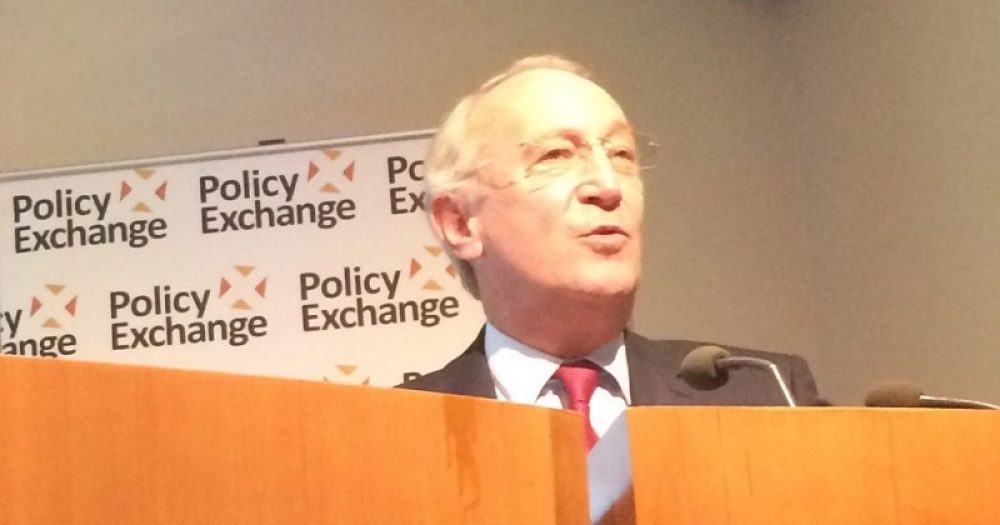A government teacher-training tsar says schools that struggle to pay for teachers’ CPD should ask parents for £1 a week.
Sir Andrew Carter, head of the South Farnham School Educational Trust and chair of the government’s independent review into teacher training, said schools need to take a “radical approach” to deal with underfunding, and reach out to parents for payments to cope with the costs of running a school.
If you can’t do it, send a letter to your parents tonight and ask for £1 a week
Speaking at the Academies Show in London today, Carter said that to adequately fund continuing professional development (CPD) for teachers, schools should add two per cent to their staff budgets.
“If you can’t do it, send a letter to your parents tonight and ask for £1 a week,” he added.
David Weston, chief executive of the Teacher Development Trust and chair of the government’s CPD group, tweeted his disagreement with Carter’s strategy.
“It would result in teachers in disadvantaged areas getting less CPD,” he said. “Almost all schools already ask parents for contributions and this already advantages schools in wealthier areas. If schools are struggling to fund CPD, increase school funding.”
I disagree with this.
– It would result in teachers in disadvantaged areas getting less CPD;
– Almost all schools already ask parents for contributions and this already advantages schools in wealthier areas;
– If schools are struggling to fund CPD, increase school funding. https://t.co/CTaUiK7ZD3— David Weston (@informed_edu) April 26, 2018
Carter previously courted controversy when he said in November 2016 when he said parents should be asked to pay a “premium” for any services provided by the school over and above their basic responsibilities.
But today he went further, and said schools should seek to address even general funding shortfalls by going directly to the taxpayer, if the government refuses to raise taxes to give schools more cash.
When he was accused by an audience member of being unfair, Carter defended his proposals.
“It’s always unfair. It’s unfair in lots of ways. It’s unfair if children are not getting an education in your school which you think is reasonable,” he replied. “Parents pay for schools anyway through their taxes. If every child at your school paid £1 a day you would have £60,000 more a year. That gives you two members of staff to teach. Or, you go along struggling.”
Schools face the choice of asking central government for more money or going direct to “the people who pay central government directly for the money”.
“I don’t know any area of England where there is a shop in a street that says ‘you are from a poor home, therefore these groceries will be free’,” he went on. “Can we say we will reduce our offer to what we are given or do we just keep adding to our offer and reduce the quality?”
He drew parallels with the NHS, which he said had successfully decided what it could and could not “reasonably afford” to fund. Education now needs “to decide what’s in and what’s out”, he said.
“What should parents have to pay in your school for the additional things you add? We as schools can no longer add and add and add. Our great sense of social justice as teachers is actually the downfall here. Sometimes we have to say no and we have to be bold enough to look to parents for the money.”
The results of a National Education Union survey of 900 staff in schools last month revealed one in five respondents said their school had been driven to ask parents for financial contributions to help with funding.
Caroline Barlow, the head of Heathfield Community College in East Sussex, said she felt Carter was “clear in outlining that the funding situation for schools is inadequate and unfair”, but said his suggestion “clearly disadvantages the schools with lower income populations”.
“Many schools already ask parents for donations to support extracurricular or enrichment activities. I am very clear teacher CPD would not fall into that category,” she said.
“The fundamental message we should all agree on is that all schools need adequate funding to support the best opportunities and practice for all students and all staff.”







Unsurprisingly, he’s not thought this through.
None of these analogies work.
The purpose of shops is to make a profit.
The NHS doesn’t charge for prescriptions for children. In fact, if I visit my hospital the only thing I pay for is parking. I don’t fund the CPD for medical staff.
Also “If every child at your school paid £1 a day…” what is the penalty if someone doesn’t pay? From what does he suggest we remove their access?
And £60,000 at £1 per week over 39 weeks is a school of 1538 pupil.
At £1 per week over 52 weeks is a school of 1153 pupils
So my local infant school would receive a maximum of £10,920
The NHS has multiple sources of income, and as referred to above has decided what it will and won’t fund.
Yes, NHS prescriptions are free for children, but the default prescription charge for adults is £8.80 per item. Is some of the income from paid prescription charges used to subsidise free prescriptions to children?
And that parking you pay for at hospitals generated £174 million last year – not a bad little earner, especially when you’ve got a captive market that can’t go anywhere else.
I don’t get your point? I agree that school leaders must decide what they will or won’t fund. My view is that class sizes are often too small above year 9, so that’s one possible source of a saving. But I don’t see the relevance of the £174 million in car parking charges. (1) They are very unpopular. (2) There’s no parallel to how schools can raise income. (3) At least they give something tangible: a car parking place.
£1 a week (a day?) to receive what, exactly? I think that’s what parents would like to know.
To be honest, it’s a very silly idea.
He should be encouraging the government to properly fund education instead of pushing schools back to a situation where schools in more advantaged areas can supplement their budgets but those in poorer areas can’t. All schools should be funded at a level where they can afford ongoing training for teachers.
Was Sir Andrew suggesting £1 a week or £1 a day? According to the article he suggested the first option in his speech and the second in an answer.
Either way, it’s unacceptable. Society pays taxes for children to receive a free education – it’s a public as well as a private good. Sir Andrew should be demanding adequate funding for education not pushing ideas which undermine the principle of free state education available to all.
I don’t agree with what Andrew Carter is saying.
But he does have a right to his own opinions and he is entitled to express them without being barracked and told what he “should” be saying.
This is just another example of terrible thinking in a climate of terrible policy making. The thing that is staggering is the lack of awareness about this sort of half-hearted thinking. A truism of modern, social democratic economies is that free education brings a net benefit. Schools are struggling with CPD provision because they do not have enough money to pay for it. Once you make all the “efficiency savings” that you can, you can only draw one conclusion if this man feels it is sensible to make these proposals. There is not enough money in the system.
Rethinking education funding is a good idea – but this is not a creditable suggestion for any political party. Perhaps rethinking how we tax the very corporations that duck their responsibilities would be a more productive consideration? You know, the ones who put us in this sorry position in 2008.
Oh for heaven’s sake this is NOT a suggestion from any political party.
Andrew Carter is CEO of the South Farnham School Educational Trust, a National Leader of Education, was the Vice Chair of the Teaching Schools Council for 4 years and was a teacher and headteacher before that.
Yes he chaired the government’s independent review into teacher training, but the clue’s in the word “independent”.
As far as I’m aware he doesn’t speak for any political party, let alone the Government.
As I’ve said above, personally I don’t agree with what he’s suggesting but he has a damn sight more experience and knowledge than me when it comes to running schools, and I’d be prepared to bet most of the people here. Absolutely he could be wrong here (I think he is) but you can’t dismiss it as “half-hearted thinking” just because you disagree.
Respectfully, where did I suggest any political affiliation for Andrew Carter? I think a, “for Heaven’s sake is a trifle OTT”. I merely suggested that this sort of thinking was not conducive to a sensible, long term solution to chronic under-funding. Once schools have burned through their reserves over the next few years, do you think we will have similar suggestions to this, such as perhaps parents should make an involuntary contribution to school funds?
The suggestion he has come up with sounds like policy kite-flying. I don’t think it’s a goer but these bonkers ideas need knocking back as quick as they can because debates like this draw attention away from the whole school funding issue.
Schools, should not be in a position where they have to scrape around from one income stream to another, just to fulfill their professional responsibilities as an educator and an employer. The more complex the funding arrangements become, the more likely that the funding will not end up where it should be. There’s been enough of that already.
That’s me banging my own political drum. I’m done now.
I’m sorry you but didn’t “merely suggest” anything.
The words you actually used were “another example of terrible thinking” and “half-hearted thinking”. Even in your response above you can’t help yourself – after trying to sound measured you resort to calling them “bonkers ideas”.
The “For Heaven’s sake” was probably a result of reading your comments on top of the other ones above where people say Andrew Carter’s “not thought this through” and tell him what he should be doing.
Your references to policy affiliation were that you said his views, which as I explained above seem to be entirely independent, were “not a creditable suggestion for any political party”. Why say this unless you think this was a political suggestion?
I’ve said in my response to you, as well as my other comment above, that I don’t agree with what he’s suggesting. But I do respect the experience behind the person who made the comments and recognise his right to make comments without being labelled “half-hearted” and “bonkers”.
This knee-jerk reaction to pillory anyone making suggestions that people don’t agree with is unfortunately common nowadays and does nothing to advance discussion and debate.